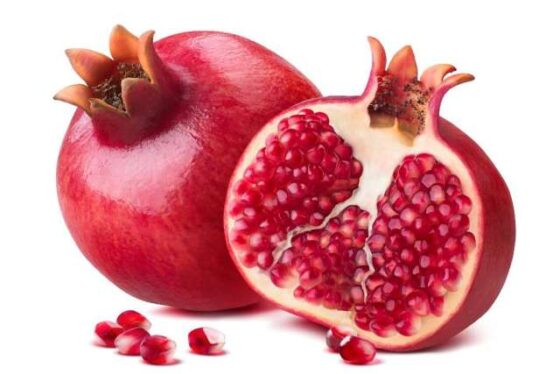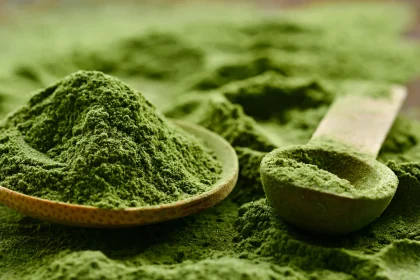Pomegranates: The Ultimate Fruit for Cardiovascular Health, Blood Pressure, and Cholesterol
In the world of superfoods, pomegranates stand out as a shining example of a fruit with incredible benefits for cardiovascular health. Native to the Middle East and Mediterranean regions, pomegranates have been cultivated for thousands of years, revered for their healing properties and distinctive taste. Recent scientific research has further highlighted the powerful role that pomegranates can play in reducing blood pressure, lowering cholesterol, and promoting overall heart health. Let’s dive deeper into why pomegranates deserve their place as one of the best fruits for cardiovascular well-being.
Nutrient-Rich Composition
Pomegranates are packed with a variety of nutrients essential for heart health. The fruit is rich in vitamins C and K, folate, potassium, and fiber, all of which contribute to healthy body functions. Additionally, pomegranates contain a range of potent antioxidants, particularly punicalagins and anthocyanins, which are responsible for many of their health benefits. These compounds help neutralize harmful free radicals in the body, reducing oxidative stress and inflammation that can damage blood vessels and lead to heart disease.
Reducing Blood Pressure
High blood pressure, or hypertension, is one of the most significant risk factors for cardiovascular diseases such as heart attacks, strokes, and heart failure. The good news is that pomegranates have been shown to have a positive impact on reducing blood pressure, particularly systolic blood pressure, which is the pressure in the arteries when the heart beats.
Several studies have demonstrated that drinking pomegranate juice can significantly lower systolic blood pressure. In a 2013 study published in Phytotherapy Research, participants who consumed 150 milliliters (ml) of pomegranate juice daily for two weeks experienced a significant reduction in both systolic and diastolic blood pressure. The antioxidants in pomegranates, especially punicalagins, help relax blood vessels, improving blood flow and reducing overall arterial pressure.
Potassium, found abundantly in pomegranates, also plays a crucial role in maintaining normal blood pressure. This essential mineral helps balance the effects of sodium in the body, a major contributor to hypertension. Regular consumption of potassium-rich foods, like pomegranates, can support healthier blood pressure levels.
Lowering Cholesterol and Improving Lipid Profiles
High cholesterol, particularly low-density lipoprotein (LDL) cholesterol, is another major risk factor for cardiovascular disease. LDL cholesterol can accumulate in the walls of arteries, forming plaques that narrow and harden them. This process, known as atherosclerosis, can eventually block blood flow to the heart and brain, leading to heart attacks and strokes.
Pomegranates are particularly effective at lowering LDL cholesterol and improving the overall lipid profile. In a 2004 study published in Clinical Nutrition, researchers found that consuming pomegranate juice reduced LDL cholesterol levels by up to 39% in patients with high cholesterol over a one-year period. The antioxidants in pomegranates prevent the oxidation of LDL cholesterol, a process that makes cholesterol even more harmful by promoting plaque buildup in the arteries.
Furthermore, pomegranate consumption has been linked to an increase in high-density lipoprotein (HDL) cholesterol, the “good” cholesterol that helps remove LDL cholesterol from the bloodstream. By lowering LDL levels and boosting HDL, pomegranates contribute to a healthier balance of lipids in the body, reducing the risk of atherosclerosis and cardiovascular events.
Anti-Inflammatory and Antioxidant Properties
Chronic inflammation and oxidative stress are key contributors to the development and progression of cardiovascular diseases. Inflammation can damage the walls of blood vessels, making them more susceptible to plaque buildup, while oxidative stress can lead to the oxidation of fats and cholesterol in the blood, accelerating the atherosclerosis process.
Pomegranates are one of the most potent natural sources of antioxidants, with higher antioxidant activity than many other fruits, including blueberries and green tea. The punicalagins and anthocyanins found in pomegranates have been shown to reduce inflammation and combat oxidative stress in the cardiovascular system. By neutralizing free radicals, these antioxidants protect the heart and blood vessels from damage, promoting long-term cardiovascular health.
In a study published in The American Journal of Clinical Nutrition, researchers found that regular consumption of pomegranate juice significantly reduced biomarkers of oxidative stress and inflammation in patients with coronary artery disease. This suggests that pomegranates may help slow or even reverse the progression of heart disease by protecting blood vessels from further damage.
Improving Endothelial Function
The endothelium is the thin layer of cells that lines the interior of blood vessels, playing a critical role in regulating blood flow, blood pressure, and overall vascular health. Dysfunction of the endothelium is a key factor in the development of atherosclerosis and other cardiovascular diseases.
Studies have shown that pomegranates can improve endothelial function, helping blood vessels to dilate properly and maintain their elasticity. A 2010 study published in Atherosclerosis found that pomegranate juice improved endothelial function in patients with coronary heart disease. This effect is largely due to the high concentration of antioxidants in pomegranates, which promote the production of nitric oxide—a molecule that helps relax and widen blood vessels.
By enhancing endothelial function, pomegranates help maintain healthy blood circulation and reduce the risk of blood clots and arterial blockages. This benefit is particularly important for individuals with existing heart conditions, as poor endothelial function is a major predictor of heart attacks and strokes.
Conclusion: The Heart-Healthy Power of Pomegranates
Incorporating pomegranates into your diet can offer a wealth of benefits for your heart, blood pressure, and cholesterol levels. With their rich content of antioxidants, anti-inflammatory properties, and ability to improve blood vessel function, pomegranates are truly a superfood for cardiovascular health. Whether consumed as fresh fruit, juice, or supplements, regular intake of pomegranates can significantly reduce your risk of heart disease, making them one of the best fruits for promoting long-term heart health.
For those looking to take charge of their cardiovascular wellness, the pomegranate offers a delicious and powerful natural solution.
Why You Want To Avoid Pom Juice:
The new Cardio Miracle formula includes over 50 active ingredients designed to boost nitric oxide levels and support cardiovascular health. Key components of this formula include:
- L-Arginine: An amino acid that helps synthesize nitric oxide in the body, improving vasodilation and circulation.
- L-Citrulline: Converts to L-arginine in the kidneys, supporting sustained nitric oxide production.
- Beetroot Extract: Rich in nitrates, which help relax blood vessels and enhance circulation.
- Hawthorn Berry Extract: Supports heart health by improving blood flow and protecting blood vessels.
- Pomegranate Extract: Loaded with antioxidants that protect nitric oxide from oxidative stress.
- Quercetin: A flavonoid that helps maintain nitric oxide levels and reduce inflammation.
- Vitamin C: An antioxidant that supports nitric oxide synthesis and prevents its degradation.
- Vitamin D3: Helps regulate blood pressure and improve overall heart health.
This comprehensive blend aims to support heart function, improve energy levels, and maintain optimal blood pressure.
See the review here:
Click here to visit Cardio Miracle’s website and get it for yourself. The powder tastes great also!
Use the discount code: healthywildfree to get 10% off your order.





